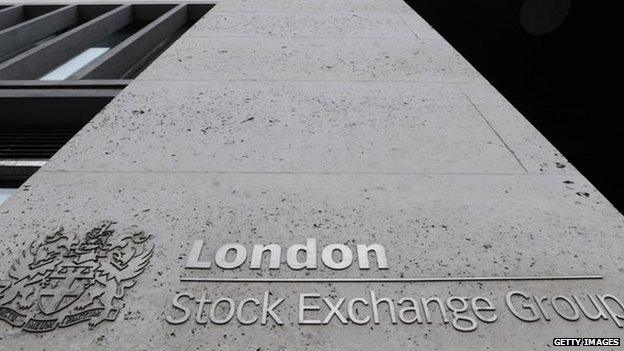Is growth stalling or ending?
- Published
- comments

There is a battle in financial markets between those betting on a permanent and temporary end to economic recovery. Who is right?
As you may recall, I came back from summer hols a bit anxious and gloomy about the world's economic prospects and therefore the UK's too.
So for me, the surprise in yesterday's market jitters is that it has taken so long for investors to recognise that deflation and low growth remain a bigger threat to the recovery than inflation.
That said, there is no science in predicting when capricious investors dump their rose-tinted eyewear and put on their "glass-half-empty" specs.
But for most of us what matters is not whether the FTSE100 or the price of US government debt is up or down in any given hour of the day, but what lies beneath the increased volatility (propensity to yo-yo) of markets.
To recap the more fundamental causes of yesterday's bout of gloom about riskier assets such as shares and commodities (or assets whose prices fall when growth decelerates) and renewed appetite for supposedly safe havens, notably German and US government bonds (whose prices rise when economic prospects worsen):
1) the biggest eurozone economies, Germany, France and Italy, are shrinking or flatlining - and their rehabilitation requires difficult and painful structural reform;
2) China's transition from debt-fuelled growth to a more sustainable model less dependent on investment in housing and infrastructure is not proving easy - and growth is slowing sharply, even in questionable official data;
3) emerging markets in general, with the possible exception of India, seem to be entering a new phase of permanently lower growth, with Russia perhaps trapped in years of stagnation or worse.
There is a new factor since I wrote on 2 September - the egregious failure to contain the spread of Ebola.
But it is not clear how much markets are pricing in the potential impact on prosperity if the free movement of people is restricted in a way that has an impact on commerce and trade.
What is important is that recent data shows inflation undershooting in countries as different and far apart as the UK and China, consumers tightening their belts in the global home of consumption, the US, and output plummeting in the West's premier exporter, Germany.
That is why those controlling the world's vast pools of wealth yesterday decided to take some of their chips off the roulette square marked "growth" and on to the square marked "risk of deflation".
This was not about any fundamental change in economic reality, but in punters perception of it.
So what do we know and what do we not know about the outlook?
Well, yesterday evening I was asked by a minister at a swanky do whether we were in effect at a party on the Titanic similar to one held just before Lehman went down.
I felt confident in saying that I didn't (and don't) think there is an immediate danger of us heading for an iceberg that would wreck our banking system for the second time in six years.
Most of our banks - though not quite all yet in the eurozone - have so much more capital than in 2007 that they should be able to absorb any shocks currently in the offing.
It is important therefore not to confuse a faltering recovery with financial meltdown.
That said a faltering recovery is a serious matter.
And here is what we don't know.
As I have mentioned before, the price of US, UK and German government bonds is telling us that we are into decades of low growth and stagnation in the rich West.
That interpretation is given added heft in a research paper co-authored by the former US Treasury Secretary Larry Summers, which says China (arguably now the world's biggest economy) could be heading for two decades of growth, external at 40% of the rate it enjoyed for 30 years (or less than 4% per annum versus 10%.
But share prices are implying that any hiatus in growth will be transient.
Which market is the oracle, bonds or equities? Blip or secular downturn?
Chances are, actually, that there is truth in both - that the next few months will see a hiatus in the recovery; and that when we get back on trend, momentum will be significantly less prosperous for us than before the big debacle of six years ago.